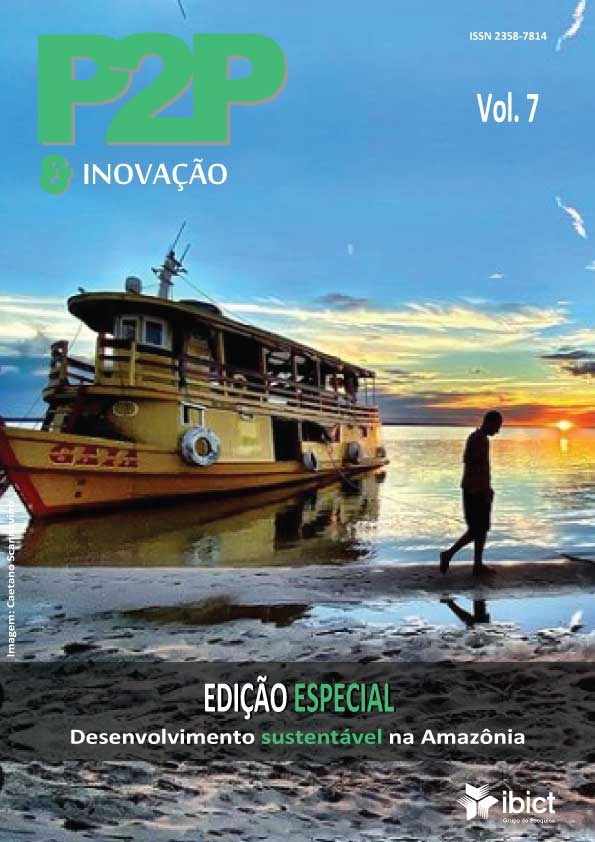Sustainability of family psiculture in the Western Amazon
analysis of the impact of local knowledge
DOI:
https://doi.org/10.21721/p2p.2021v7n1.p10-33Keywords:
Small Fish Farmers, Amazon, Sustainability, Local KnowledgeAbstract
The Green Revolution has led to an abundancy in food production, however, not without social and environmental consequences. The substitution of more democratic sources of knowledge – local knowledge – by capital demanding agricultural technologies has led to an increase in efficiency and predictability in food production. However, local sources of knowledge that subsidize rural production in small scale still endure. This paper aims to analyze the impacts of local knowledge to sustainable development, analyzing the case of small fish farmers in the Vale do Jamari region in the western Amazon, in Brazil. The region is characterized by its sizable participation in the emergence of fish farming of native species in Brazil, with production growing exponentially in the last decade. Data was collected from primary sources through semi structured interviews with farmers and technicians within the region and open interviews with multiple stakeholders of the production chain, besides technical visits. Production of native fish species is still relatively recent and with low productive technology, in a way that multiple local technologies were developed through day to day experience and shared between farmers. Data points to the fact that local knowledge had positive impact in economic development, while presenting positive impacts to the community with reduced stress to the natural environment.
Downloads
References
BANCO MUNDIAL. Indigenous Knowledge: local pathways to global development. World Bank, 2004a.
BRASIL. Agricultura Familiar Produz 70% dos Alimentos Consumidos por Brasileiro. Portal Brasil, 2016. Disponível em: http://www.brasil.gov.br/economia-e- emprego/2015/07/agricultura-familiar-produz-70-dos-alimentos-consumidos-por- brasileiro. Acesso em: 03 mar. 2017.
CLEVELAND, David A; SOLERI, Daniela. Farmer Knowledge and Scientist Knowledge in Sustainable Agricultural Development: Ontology, Epistemology and Praxis. SILLITOE, Paul (ed). Local Science vs. Global Science Approaches to Indigenous Knowledge in International Development. Berghan Books, 2009.
DAWSON, Neil; MARTIN, Adrian,; SIKOR, Thomas. Green Revolution in Sub- Saharan Africa: Implications of Imposed Innovation for the Wellbeing of Rural Smallholders. World Development, v.78, pp.204-2018, 2016.
ELLEN, R.; HARRIS, H. Concepts of Indigenous environmental knowledge in scientific and development studies literature: a critical assessment. East-West Environmental Linkages Network Workshop. Canterbury, mai. 1996.
FAO. What is Local Knowledge? Building on Gender, Agrobiodiversity and Local Knowledge. Food and Agriculture Organization, Rome, 2004.
FARMER, B. H. Perspectives on the “Green Revolution” in South Asia. Modern Asian Studies, n.1, v.20, pp. 175-199, 1986.
FLINT, R. Warren. Seeking Resiliency in the Development of Sustainable Communities. Research in Human Ecology. Human Ecology Review, v. 17, n. 1, 2010.
FLINT, Warren. Sustainable Development: What does sustainability mean to individuals in the conduct of their lives and businesses. In MUDACUMURA, G.M; SHAMSUL HAGUE, M.S. (eds.), Handbook of Development Policy Studies, Nova York, Marcel Dekker, 2004.
GÓMEZ, Miguel et al. Post-Green Revolution food systems and the triple burden of malnutrion. FAO Working Papers, ago. 2013. Disponível em: http://www.fao.org/fileadmin/templates/esa/Papers_and_documents/WP_13- 02_Gomez_et_al.pdf. Acesso em: 12 nov. 2016.
GIBSON, Robert B. Beyond the Pillars: sustainability assessment as framework for effective integration of social, economic and ecological considerations in significant decision-making. Journal of Environmental Assessment Policy and Management, v.8, n.3, pp.259-280, 2006.
HOLT-GIMÉNEZ, Eric.; ALTIERI, Miguel, A. Agroecology, Food Sovereignty and the New Green Revolution. AGROECOLOGY AND SUSTAINABLE FOOD SYSTEMS, V. 37, pp. 90-102, n.1, 2013
IBGE. Produção da Pecuária Municipal 2015. Instituto Brasileiro de Geografia e Estatística, 2016. Disponível em: http://www.ibge.gov.br/home/estatistica/economia/ppm/2015/default_xls.shtm. Acesso em: 06 mar. 2016.
KOLAWOLE, Oluwatoyin D. Soils, science and the politics of knowledge : How african smallholder farmes are framed and situated in the global debate on integrated soil fertility management. Land Use Policy, n.30, pp. 470-484, 2013.
MURDOCH, Jonathan; CLARK, Judy. Sustainable Knowledge. Geoforum, v. 25, n.2, pp. 115-132, 1994.
PINGALI, Pl. Green Revolution: Impacts, limits and the path ahead. Proc Natl Acd Scie USA, v.109, n.31, jul. 2012.
SEBBY, Kathryn. The Green Revolution of the 1960s and Its impacts on Small Farmers in India. Dissertação de Mestrado – Universidade de Nebraska, Environmental Studies Program, 2010.
SILLITOE, Paul (ed). Local Science vs. Global Science: Approaches to Indigenous Knowledge in International Development. Berghan Books, 2009.
SINGH, R.; PRETTY, J.; PILGRIM, S. Traditional Knowledge and biocultural diversity: learning from tribal communities for sustainable development in northeast India. Journal of Environmental Planning and Management, v. 53, n.4, 2010.
SINTEF. Carbon footprint and energy use of Norwegian seafood products. SINTEF Fisheries and Aquaculture Report. Noruega, dezembro, 2009.
STONE, Glenn D.; GLOVER, Dominic. Disembedding grain: Golden Rice, the Green Revolution, and heirloom seeds in the Philippines. Agriculture and Human Values, v.34, n.1, pp.87-102, 2016.
WARBURTON, Hillary; MARTIN; Adrienne. Local People’s Knowledge in Natural Resources Research. Socio-economic Methodologies for Natural Resources Research. Chatham, Natural Resources Institute, 1999.
WARREN, D. M. Using Indigenous Knowledge in Agricultural Development. World Bank Discussion Papers No. 127, Washington, Banco Mundial, 1991.
YANOW, Dvora. Translating Local Knowledge at Organizational Peripheries. British Journal of Management, v. 15, p. 9-25, 2004.
Downloads
Published
Issue
Section
License
The journal is published under the Creative Commons - Attribution - Noncommercial - Share Alike 3.0 Brazil.
The published work is considered collaboration and therefore the author will not receive any remuneration for this as well as anything will be charged in exchange for publication.
All texts are responsibility of the authors.
It’s allowed partial or total reproduction of the texts of the magazine since the source is cited.














